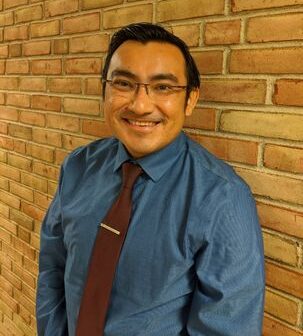Class at Calvin Learns about Deaf Culture and Language
For 25 years, Deaf and Hard of Hearing Services has worked from the principle that knowledge is empowerment.
So when the organization got a request from a Calvin University professor to do a presentation for his class last semester, it was quick to respond with an enthusiastic “yes.”
Abraham Ceballos-Zapata teaches Spanish and Language Education courses at Calvin, including a class called “Introduction to ESL and Bilingual Education.”
In that course, he said, “we talk about how language interacts with society.”

That includes, he added, the experiences of various language communities in the U.S. and abroad and issues of language identity.
“Deaf and Hard of Hearing Services is an organization that models language advocacy through its work,” he said. “It was important to me that my students could see how a local organization brings together people with various areas of expertise towards a common purpose.”
Ceballos-Zapata had added a book chapter reading titled “Deaf People, Bilingualism and Bilingual Education” for his students last semester and thought it would be important to use the chapter as background for a conversation with a guest speaker from the Deaf community.
“While I could lead a discussion in class based on the chapter,” he said, “I did not want to do it without having a voice in that conversation that has experience with the topic. I searched online for local organizations involved with the Deaf community and Deaf and Hard of Hearing Services was one of the first hits. When I browsed the website I found out they offer seminars and trainings for various organizations. And that is how I decided to reach out to them.”
A team of people from D&HHS presented to his class (virtually because of Covid), including:
• Rowan O’Dougherty, the president of the Board who is a member of the Deaf community, an American Sign Language user, and a teacher of ASL and Deaf History and Culture
• Linda Vander Leek, the Interpreter Services Specialist and a Cultural Awareness and Sensitivity Training (CAST) presenter
“It was excellent,” Ceballos-Zapata said. “We talked about common terms in the Deaf Culture, Deaf values and how they impact the classroom settings, how to evaluate a bilingual and bicultural class for Deaf children, and provisions made by the Americans with Disabilities Act.”
He added that one important piece was a discussion of linguisticism, the act of judging a language or languages as superior to others.
“We spend a lot of time discussing and dismantling language ideologies in class,” he said, “but it has always been in relation to other languages and not specifically in relation to ASL. This presentation brought ASL into that conversation and taught me the term ‘audism’ which is a similar idea but in this case, one would consider oral languages superior.”
His students agreed.
Kelsey Bobeldyk is a Calvin sophomore from Jenison who is studying Spanish Secondary Education and hopes to teach either high school Spanish or ESL (English as a Second Language).
“I thought the D&HHS presentation was wonderful and incredibly insightful,” she said. “I learned more about a community I had minimal knowledge of which is so important. It was especially beneficial to understand more about how sign language operates as a full and complete language. Additionally, we were taught lots of good information regarding terminology that surrounds the Deaf community.”
For Deb Atwood, executive director of D&HHS, such feedback is music to her ears.
“A big part of our mission as an organization is understanding,” she said, “so we are always grateful for the chance to partner with other organizations, including nonprofits and for-profits, to help them better know the Deaf and Hard of Hearing communities. It was great to present at Calvin, and we hope to continue the partnership.”
